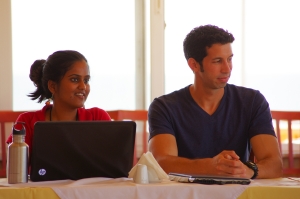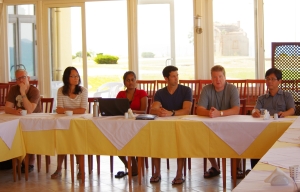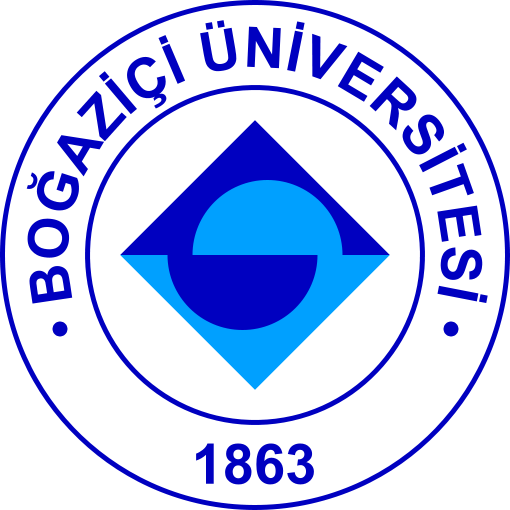 Sonal Kothari and Ofer Idan Sonal Kothari and Ofer Idan
Panel Co-chairs |
The panel discussion for the 11th international summer school for biocomplexity from gene to system was held on June 29th 2012 and focused on opportunities, challenges and education in healthcare sciences and biomedical engineering. Questions raised by students and panel members were answered and discussed by both the faculty panel members and participating students, allowing a vibrant discussion fueled by different perspectives, backgrounds and experiences of all participants.
A key topic that came up in several contexts during the panel was career development. All faculty panel members expressed the importance of recognizing and taking advantages of opportunities that arise during career development. Students should understand that many changes are made throughout their career path and should accept these changes as opportunities instead of obstacles. Faculty panel members suggested that students should direct their research efforts towards new emerging topics in science and engineering such as early detection, target drug delivery, non-invasive diagnosis, and personalized medicine.
|
|
It was agreed that attendance in programs such as the summer school will expose students to new emerging topics and as such it is of utmost importance for career developments of both undergraduate and graduate students. With regards to a postdoctoral position, it was stressed that it is beneficial to conduct research in a field different from a studentís PhD, with an emphasis on finding a good mentor whom the student can connect with both personally and professionally. A related topic which concerned many students was the apparent diminishing funding opportunities for academic positions and its effect on the availability of positions for young researchers. Faculty panel members agreed that funding options have been reduced but that this will change in the near future, with a renewed increase in scientific funding. Faculty panel members suggested that students should look for research opportunities that align well with the roadmaps of the national funding agencies to facilitate future research funding. A discussion comparing research opportunities through industry as compared to research in academic institutions, and an explanation of the academic tenure path followed. It was agreed that current positions in top academic institutions are very competitive and that alternative career paths are becoming more prevalent among graduating PhD students, such as industry internships or postdoctoral positions in national labs.
Education was another important topic discussed in the panel. The need to integrate good teaching alongside excellent research in universities was agreed on by all panel members. The difficulty for professors to focus both on research and education is apparent in research-focused universities, both at the graduate and undergraduate level. Faculty members described how an emphasis on teaching has been growing in the past few years, with the National Science Foundation pushing for better education and outreach program, through requirements and incentives in funding. It was agreed that in top universities the focus is still on research, but that the overall trend is changing, with small universities already attempting to balance a research and teaching career for professors. The benefits of teaching for a professor, such as developing communication skills and the ability to disseminate research, was also stressed as being very beneficial to a professorís research career. This makes teaching an inseparable part of the academic career and an integral part of research, as the ability to communicate oneís research is no less important than conducting research itself.
Closely related to the general topic of education in the biomedical engineering world is the MD/PhD program and its implications on research development. Faculty members and students presented different experiences regarding the program, with an agreement that when done properly and with research in mind, the MD/PhD program can lead to a successful path. Faculty members mentioned funding opportunities from the NIH specifically for the training and development of MD/PhD students and the added benefits of having a medical degree to a researcher, such as the ability to conduct clinical research in various fields. The importance of protecting research time when also administering to patients was discussed and it was agreed that universities and medical institutes have the need for allowing MD researchers to work full-time in their research capacity.
The final and perhaps most important topic was that of public education and the moral responsibility of scientists and engineers. Students were concerned that while they can see the trouble the academic world is facing today, such as diminishing funding and lack of knowledge by the general public, there is little they seem to be able to do. Faculty panel members agreed that there is need for better representation of the scientific community to the public and argued that there are ways for graduate students to contribute to this cause. It was agreed that public awareness of recent advancements of science is critical for development and that graduate students can aid by joining scientific societies such as IEEE or AAAS and taking an active role in assisting these organizations to affect public opinion and petition to politicians for support. Better dissemination of science was determined to be crucial and that the scientific community must embrace marketing strategies in order to raise public awareness to the difficulties facing science and the advancements it has made so far. The students agreed that an active participation on their part in petitioning politicians and funding agencies, while helping to educate the general population will be beneficial for their future careers.
In conclusion, the 2012 summer school panel helped raise some important questions from the students regarding their future scientific careers, the role of education and the forefront of scientific advances that will shape the community in the coming years. The conclusions reached in this panel helped the students shape an understanding of the paths available to them and created a sense of community connecting faculty and students.
|
 Sonal Kothari and Ofer Idan
Sonal Kothari and Ofer Idan

